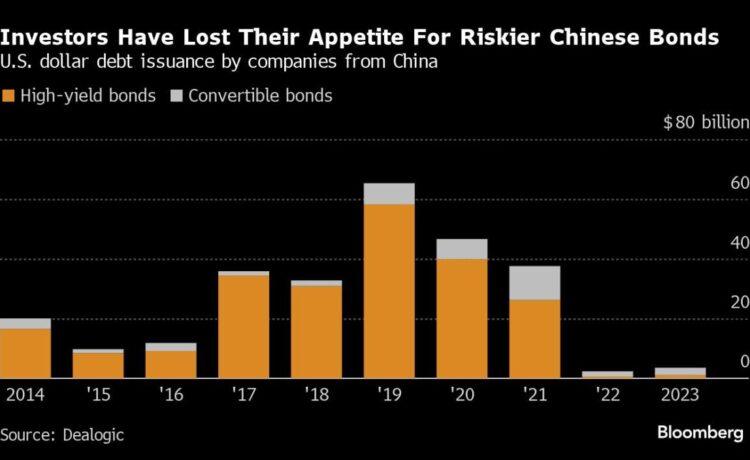(Bloomberg) — Hedge funds and other international investors are sounding alarms after a profitable education company from China defaulted on its convertible bonds in March.
Most Read from Bloomberg
A group of bondholders, which includes some of Asia’s most prominent hedge funds, have alleged in public statements that the company chose not to pay its offshore debt even though its business is healthy and growing. The investors, which include Hong Kong-based Oasis Management Co., PAG and Enhanced Investment Products Ltd., said the borrower’s action could set a dangerous precedent for the broader market.
The borrower in question is XJ International Holdings Co., a 16-year-old company that used to be called Hope Education Group Co. It said in a filing last month that it had defaulted on the $315 million of convertible bonds, which are hybrid securities that can be converted into stock. Holders had used an option to demand repayment in March.
The bloc of investors — called the ad-hoc group, a term often used when creditors band together to try to recoup money — holds 49% of the convertibles. It moved swiftly to file a winding-up petition in Hong Kong against the company. The writ they filed is confidential and not publicly available.
XJ didn’t reply to Bloomberg’s requests for comment. It said on March 28 that it was having difficulty redeeming the bonds because of “the impact of the external environment, industry policies, and the Company’s financial condition.” In an April 14 statement, XJ said the cash on its balance sheet could only be used to run its schools, and that it has “a preliminary plan” to settle or restructure the defaulted debt.
The funds’ predicament shows how perilous investing in Chinese corporate bonds has become, after the country’s property sector downturn caused a wave of international debt defaults.
“This could trigger a sector-wide reassessment of credit risk,” said Kher Sheng Lee, Asia-Pacific co-head of the Alternative Investment Management Association, a global body representing hedge funds and private credit funds. He said the incident shows that a company’s liquidity and ability to repay its debt aren’t the only factors that investors should consider when assessing default risk. “Equally vital are investor confidence and a firm’s willingness to fulfill its financial obligations,” said Lee, who isn’t involved in the XJ case.
Companies from China have defaulted on more than $100 billion in offshore bonds since 2021, according to data compiled by Bloomberg News. International bondholders have been struggling to recover money from some companies whose assets and operations are mostly onshore, as it has been difficult to enforce offshore court rulings in mainland China.
Issuance of new high-yield dollar bonds and convertible debt from Chinese companies has dropped sharply, after many investors have backed away from the formerly bustling market.
Other Chinese education companies raised money from the offshore debt market during better times. China Education Group Holdings Ltd., last month redeemed the last of its HK$2.4 billion ($301 million) in convertible bonds after repurchasing or paying off most of the debt earlier. China Maple Leaf Education Systems Ltd. fully redeemed $125 million in converts in February, after failing to do so previously. Another company, China YuHua Education Corp., missed a December 2022 redemption and worked with creditors to restructure the remaining convertible bonds.
XJ, which hails from the southwestern Chinese city of Chengdu, operates 24 schools, including universities, junior colleges and vocational institutes that are mostly in China. The Hong Kong-listed company posted 3.58 billion yuan ($495 million) in revenue in its 2023 fiscal year which ended in August, up 18% from the previous year. It also reported a 20% increase in gross profit.
In November 2023, XJ had said it expects to be able to “meet in full its financial obligations as they fall due for the foreseeable future.” The company reported cash and bank balances of 2.9 billion yuan at the end of August.
Despite that, XJ in March defaulted on the outstanding convertible bonds that it issued in 2021. The five-year, zero-coupon securities had terms that required the company to redeem them that month if bondholders required it to — which they did.
The ad-hoc group of bondholders has since then released strongly worded statements accusing XJ of avoiding its debt obligations and not engaging with them. It also said that XJ repaid a HK$620 million loan to banks including Standard Chartered Plc in January this year, some 18 months ahead of its maturity date. It said XJ owes bondholders $325 million, including accrued interest.
A winding-up hearing for XJ has been scheduled for June. “The Company believes that it is in the best interests of its creditors to achieve a reasonable debt restructuring plan,” XJ said in its recent filing, adding that the winding-up petition could harm its viability and hurt creditors’ recovery prospects.
XJ’s shares have already slumped more than 90% over the past three years to about 22 Hong Kong cents, giving the company a market capitalization of HK$1.8 billion and rendering the warrant to convert the bonds to shares at HK$3.85 effectively worthless. The company was caught up in a broader Chinese education-stocks sell off in 2021, when regulators in the country banned after-school tutoring companies that teach compulsory school subjects from making profits and raising capital.
Beijing has instead been encouraging vocational training and higher education, a fact that XJ noted in its latest financial report. It said student enrollment at its schools hit a record high of 290,000 last year. In Thailand and Malaysia, where the company also has schools, XJ’s international offshoots were able to raise money from Thai baht and Malaysian ringgit bond sales last year, guaranteed by a trust fund under the Asian Development Bank.
Most Read from Bloomberg Businessweek
©2024 Bloomberg L.P.















